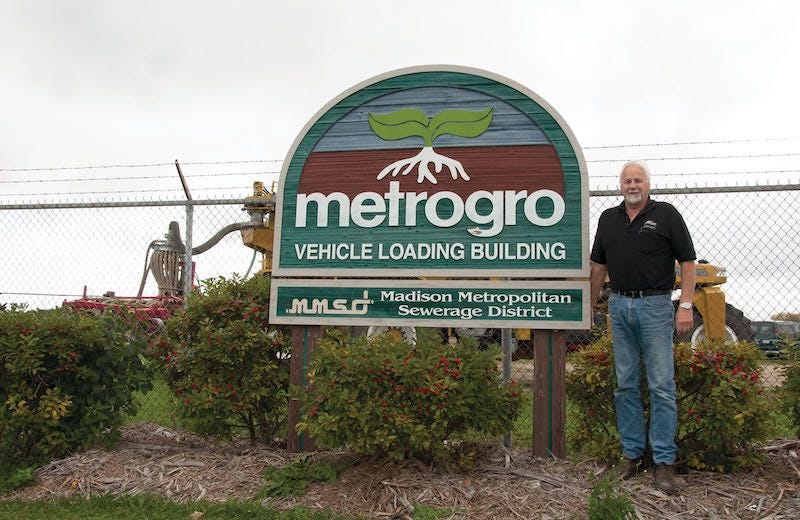By Kelsey Bright

The world is overflowing with waste. The trash we throw in our garbage cans piles up in landfills, taking up space that could otherwise be used for more productive purposes. But what about the waste we’re flushing down our toilets and rinsing down our sinks? Wastewater is treated and reused, but the solids that are separated are often times placed into specialized landfills or incinerated. Madison Metropolitan Sewerage District (MMSD), the plant at which the city’s wastewater is treated, has a more environmentally forward approach: using the solid organic waste to fertilize local farm fields. Thus, the Metrogro program was developed to distribute biosolids to what is now 494 farms and counting.
Metrogro has successfully developed into a biosolids-recycling program that has been in operation since the early 1970s. Michael Northouse, the manager of Metrogro, has been a part of the program from its starting phases and has since helped it grow into the massive fertilizer provider it is today. Before Metrogro’s development, the biosolids produced from the plant were used in other ways. “Back in the early days, [the plant was] still producing fertilizer from the city’s solid waste and then people from gardens would come and get it,” Northouse says. “As the city grew, the demand wasn’t enough for the amount of biosolids that they were generating, so the plant put the biosolids in storage lagoons for years. Once the lagoons became full, the Metrogro program started.”
“This is probably one of the cheapest ways to deal with biosolids… If we didn’t use this method, we would probably have to take the waste to to a landfill or incinerate it, which adds up [in cost].”
The process of placing Metrogro’s biosolids on a farm field starts with a farm site approval. “For every place that applies [to the program], Metrogro has to do a site approval,” Northouse says. Regulations state that fields with higher than a 12% slope, or fields that have too shallow of bedrock or a water table are ineligible for biosolids placement. “I have to map out the field and look at the soil types in the field because there are certain regulations. So we have to go through a whole process,” Northouse says.
Once a field is approved, biosolids can be laid in-season courtesy of Metrogro. A large machine called a Terragator rolls over the field, using needle-like nozzles attached at the back to inject the biosolids eight to ten inches into the ground. Once placed, the high levels of phosphorous, nitrogen and micronutrients give farm fields the fertilization necessary to produce high-quality crops.
The biosolids program is not only beneficial for its material recycling, but also for its cost-effectiveness. Metrogro gives biosolids to farmers, and even plants it on their fields, for free. The funds for the program come from a portion of the sewer bill that Madison residents pay. The funds required from users would be significantly greater if MMSD chose other methods of disposal. “This is probably one of the cheapest ways to deal with biosolids. We don’t charge the farmers for this because they’re doing a favor for us as users by generating this land,” Northouse says. “If we didn’t use this method, we would probably have to go to a landfill or incineration, which adds up [in cost].”
With the placement of biological waste on land, there are reasonable concerns voiced by the public. Worries of water contamination, unpleasant odor and hazardous chemicals are calmed by the extensive efforts of the Metrogro program. “We do well monitoring. When we do these fields, we’ll randomly test the wells of nearby houses to give the people assurance we’re not polluting their water,” Northouse says. In addition, the possibility of odor from the waste is eliminated due to the injection process involved in field application. The solids are incorporated into the ground, which conveniently masks odor, eliminates the possibility of runoff and ensures maximum nutrient absorption by the crop. The health hazards of the biosolids are also minimal because of the intense treatments they must go through. “The DNR and EPA set standards that we have to meet with heavy metals. We meet or exceed them, because there’s so much pre-treatment,” Northouse says.
However, some chemicals are unavoidably present. “We have a lot of phosphorous in our product, which is great for the farming end of it. But at the environmental end of it, there’s a lot of issues.”
Phosphorous is a vital nutrient for the crops that farmers are growing, but it is a serious problem for surrounding bodies of water. Farm runoff can travel into ponds and lakes, which when contaminated with phosphorous can lead to algal blooms, an infestation of algae that can kill almost all living organisms within the body of water. This is an unfortunate downside to an otherwise very productive system.
The City of Madison has taken many steps toward a greener way of life, including transforming waste from what could be another huge landfill to a product that encourages life and growth. Fortunately, biosolids are a renewable resource, so the Metrogro program is bound to last for many years to come. So as long as the people of Madison are still making trips to the bathroom, farmers will get their Metrogro.
